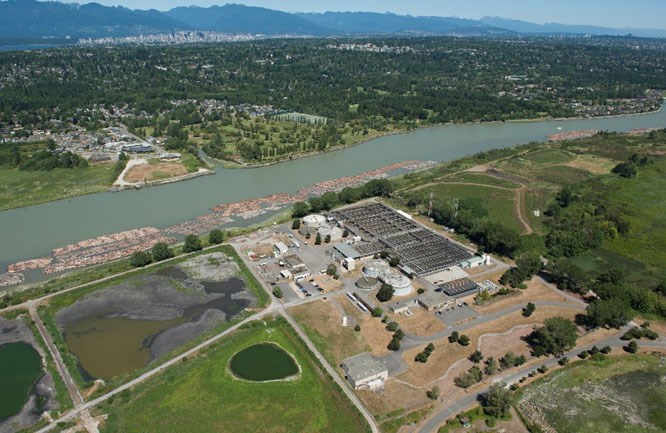Only half of the contaminants and chemicals that go down the drain in our homes are being filtered out at the existing Iona Island Treatment Plant, before the wastewater is dumped into the Georgia Strait.
The Iona plant is slated to be replaced by 2030, and an environmental group wants the Metro Vancouver regional body to adopt the highest level of sewage treatment for the new facility, which would filter the water to a level where it’s almost drinkable.
Christianne Wilhelmson, executive director of the Georgia Strait Alliance, called the chance to implement tertiary treatment at the Iona Wastewater Treatment Plant “the opportunity of a lifetime.”
The final two public consultations, which give the community a chance to raise concerns or ask questions about the project, on the new plant will go ahead – virtually – next week. The new plant will be built on the site of the existing one.
The current Iona plant only filters at a primary level – the lowest level of treatment – said Wilhelmson, making it the last “egregious” facility along the Fraser River. At that level, only about 50 per cent of contaminants, microplastics and chemicals are filtered out. The rest, she said, goes into the river and the ocean.
“We have a need to go above and beyond when it comes to treating our sewage,” said Wilhelmson, adding that, on average, 450 liters of wastewater is removed from every house – such as through sinks, laundry and toilets – per day.
“The Iona plant is discharging right into the Salish Sea, right at the mouth of the Fraser River, which is the most important salmon bearing river in the province. And it’s discharging into habitat where the Southern Resident killer whale lives.”
Once the contaminants enter the ocean, she said, they enter the food chain through small microorganisms, which are then eaten by larger animals. The contaminants’ concentration also magnifies as they go up the food chain, and can be found in the blubber of orcas, causing harm to their health. Currently, there are only 72 Southern Resident killer whales left.
Other treatment plants along the river filter at a secondary level, she said, which is considered the “minimum standard.”
Meanwhile, tertiary treatment, said Wilhelmson, is the most stringent level of wastewater treatment available, and can remove enough contaminants that the water is almost drinkable.
Having tertiary treatment would also allow the Iona plant to implement future wastewater technologies, said Wilhelmson.
The City of Richmond also supports tertiary treatment at Iona.
In January, the city voted to send its comments and recommendations to Metro Vancouver regarding the planned facility. In addition to the tertiary treatment, the city asked Metro Vancouver to consider the possibility of using the wastewater for irrigation.
Last September, Metro Vancouver approved a tertiary level of treatment for the new North Vancouver sewage plant, which raised the $778 million budget of that project by $29 million.
“I think that definitely helped make it easier for Metro Vancouver to be open to tertiary,” said Wilhelmson. “But we need people to stand up and say that as well so Metro Vancouver hears that.”
The cost of replacing the Iona plant is pegged at $1.9 billion. The current plant opened in 1963, and serves 600,000 residents and businesses in Richmond, Vancouver, UBC and some areas of Burnaby.
The final two community engagement sessions are scheduled for Tuesday May 19, from noon to 2 p.m., and Thursday May 21, from 6:30 p.m. to 8:30 p.m. Anyone interested in attending one of the virtual meetings can register online.



